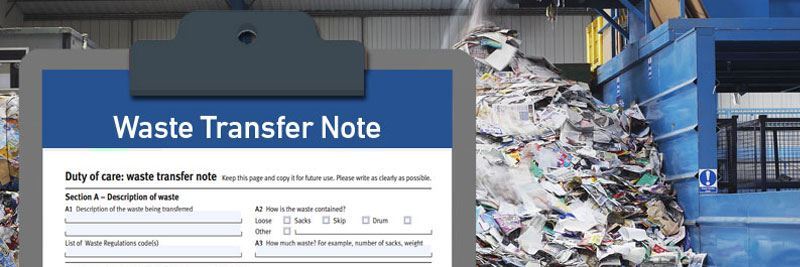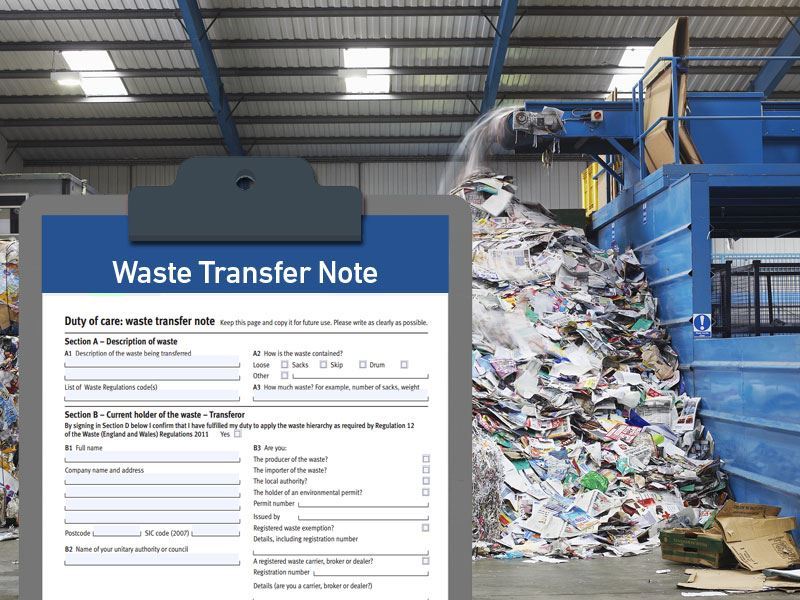If you’re responsible for managing your company’s waste management or have dealt with it in the past, you’re likely to have come across the terms ‘Duty of Care’, and ‘Waste Transfer Note’ – what do these mean?
Duty of Care
When talking about waste management, duty of care refers to the responsibility you have over your business waste. Your duty of care lasts from the moment your produce the waste up until you hand it over to, or have it collected by, a licensed waste management business. For the most part, this is where your responsibility ends, however you’re still responsible to check how that business handles your waste, and report it if you feel they are not following the correct duty of care.
Your duty of care requirements
As part of your duty of care, you need to ensure that you:
Classify your waste
You must clearly describe the waste you produce before you have it sent off to be recycled or disposed of. Doing this allows you to effectively decide how it should be disposed of, and also helps you to complete your duty of care paperwork which much be given to your waste contractors.
Register your premises
If you produce more than 500kg of hazardous waste in any 12 month period, you must register your business premises. Hazardous waste is described as any waste that can be harmful to human health, or the environment.
Apply for a permit
In most cases, you’ll need a permit to store, treat or dispose of your waste. The price of said permit depends on your type of business activity, and factors in the environmental risk of your waste habits. You can check if you need, and apply for, an environmental permit here.
Correctly store your waste
Your duty of care includes how you store your waste. It must be:
In a secure place
In suitable waste containers so waste cannot leak or spillover
Be properly labelled with the type of waste contained
Ensure that all waste containers are covered and sealed, to stop waste from blowing away, or falling out
Waterproof any bins where the waste inside would be prevented from being reused or cause contaminated run-off, if wet
Ensure your waste is moved legally
When it comes to the transportation of waste, you must ensure that you’re following the rules. To move waste off your business premises, you need to have either:
A licensed waste business to collect your waste
A license to transport waste on your own (Apply here)
When it comes to recycled goods, you or your waste carrier must set up separate collections of waste for: paper and cardboard, plastic, metal and glass unless TEEP is applied.
Check that the company you hand over your waste to is licensed
It falls under your duty of care to ensure that the company you agree to take away your waste is a licensed waste carrier. It is important that you check this before signing a contract, and keep proof of it (Take a copy of their license for your own records).
Waste Transfer Note
A Waste Transfer Note (Often referred to as WTN) is a document that confirms and details the transfer from one person (or business) to another. Every time you pass on, have collected, or received waste from another party, it must be covered and certified by a WTN.
The goal of a WTN is to ensure that from the moment of creation, to the last process for its disposal, there is a clear auditable trial that documents your waste’s journey. As a business, you must keep your WTN’s for at least two years, and be able to produce them at any given time to the environmental regulator or local authority.
There is no set in stone standard WTN, and a lot of waste carriers create their own version to distribute to customers.
One thing that is true of all WTN, however, is that they must contain the same information, and that is:
A description of the waste being collected/recycled/disposed of
Any processes that the waste has been through prior to collection or disposal
How the waste is contained, concealed or packaged
How much waste there is
The place, date, and time of transfer
Name and address of both parties
Permit, Licence or Exemption details of the party receiving the waste
The correct EWC (European Waste Catalogue) code of the waste
The SIC (Standard Industry Code) of your business – Here’s a handy list
Click here to see an example of a Waste Transfer Note
Want to know more? We’ve also written guides on the 2015 Waste Regulations, TEEP Guidance and a plethora of other articles over on our blog!




